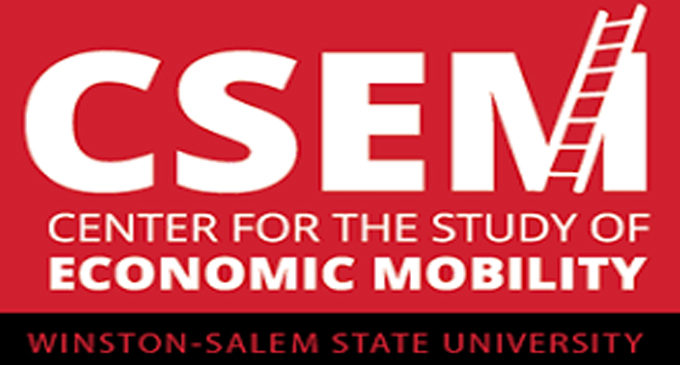Women’s stories underscore importance of CSEM research

By John Railey
Marcialena “Marci” Green of Winston-Salem senses the way potential employers view her. “Just to look at me, without getting to know me, the first thing you see is that I am full-figured, so a lot of times I’m being judged by my size, plus the fact that I’m in a wheelchair. I get all dressed up, with my hair done, for an interview and I don’t get anywhere,” Green said in a recent interview. “A lot of times you’re judged on your appearance. It doesn’t matter how well you’re dressed, you’re judged on your size.”
Anastasia Powell of Winston-Salem, who is blind and serves on the Mayor’s Counsel for People with Disabilities, said, “It would be nice for people to be more inclusive and diverse in their way of thinking on who they hire and who they give opportunities to. Making the playing ground level for all people is very important.”
As Black women with physical challenges, Green and Powell welcome a study by Research Fellows from Winston-Salem State University’s Center for the Study of Economic Mobility (CSEM). Dr. Tammara Thomas and Dr. Keisha Rogers, associate professors in WSSU’s Department of Rehabilitation Counseling, are exploring the hurdles to economic mobility for Black women with physical and mental health disabilities in Forsyth County. Through a survey, they found that people with mobility impairments are roughly 1.7 times more likely to be unemployed than those without. Initial results also show that a larger share of Black females (66.7%) with mobility impairments report being unemployed, compared to all other groups with mobility impairments (50%). Thomas and Rogers hope to use their findings to break down job barriers for women with those challenges.
“This is not only about helping these individuals,” CSEM Director Craig Richardson said. “There is the ripple effect, with what happens with their families and the employers. If you even just touch one life, that’s huge, and we may reach a lot more than that.”
Powell, 47, is internal communications manager for IFB Solutions, formerly Winston-Salem Industries for the Blind. She saw her share of challenges before coming to IFB, which she credits as a very supportive employer. “The job search was a nightmare. Once an employer saw ‘blind’ on the application and a cane in my hand, the interview was over. Seventy percent of working-age adults who are blind are not employed. This isn’t because they don’t want a job, it’s because doors close in their faces when employers find out they are blind. We are seen as a liability or that we need our hand held and we don’t.”
Green, 55, is a native of Washington, D.C., where she graduated from high school and technical school. She worked as a dental assistant, a receptionist and in customer relations. She is bipolar, and used drugs and alcohol to self-medicate. She had a best friend in Winston-Salem and moved here in 2009 with her son, when he was a teenager, to make a fresh start. She drove a cab and continued to battle substance abuse. “I made some bad decisions,” she said. She suffered an ankle injury in a fall and that plus knee problems put her in the wheelchair. She has been sober for two years now, she said.
“I’m clean now,” she said. “Everyone has a past, but I’m going into my future.”
She has received employment counseling at the Enrichment Center in Winston-Salem and wants to find a job in customer service. “I’m a people person,” she said. “Up until Corona hit, I had been a volunteer greeter at the Shalom Project’s food pantry.”
In looking for work, Green has encountered two challenges that CSEM is researching and offering solutions on: public transportation and the benefits cliff, or, perhaps more accurately, “the disincentives desert.” That CSEM work, focused on a broader population, complements the research Thomas and Rogers are doing.
Green relies on Winston-Salem Transportation Authority buses to get to job interviews. The buses, which once ran every 30 minutes, now only make most rounds every hour. Many bus stops do not offer seats or shelter. Those factors are even harder on those with physical challenges. “It’s difficult just trying to get from Point A to Point B,” Green said. “I also use Trans-Aid, but sometimes their timing is not my timing.”
Powell has a husband and three adult children who can drive her. But she often uses Uber/Lyft and Trans-Aid to retain her independence, she said.
Green has declined to take some jobs because of the disincentives desert: The jobs paid just enough to cause her to lose her food-stamp and rent-assistance benefits, but not enough to sustain her after the loss of those benefits. “It’s really difficult,” she said. “There is no easy way to put it. The system is not designed for us to get ahead. I want to work. I just can’t find a job that pays enough.”
Rhonda Dioum, a WSSU graduate and the director of Employment Gateway at the Enrichment Center, knows Green and said her benefits situation is all too familiar. “It’s like a Catch-22 situation,” Dioum said. “They want to be independent, but they can’t because some of their services will be taken away. We see a lot of that.”
Dr. Thomas has said that Black women with disabilities are often “that pivotal person in the family. They hold a lot of roles. But they have been disenfranchised in terms of competitive salaries. How does being a woman and having a disability impact their ability to attain the great American dream of success? How do we go from have-not to having?
“If we could engage or increase the ability of people with disabilities, especially Black women, to engage in meaningful, gainful career and employment outcomes, it would be beneficial overall for individuals and society.”
John Railey, raileyjb@gmail.com, is the writer-in-residence for CSEM, www.wssu.edu/csem.











